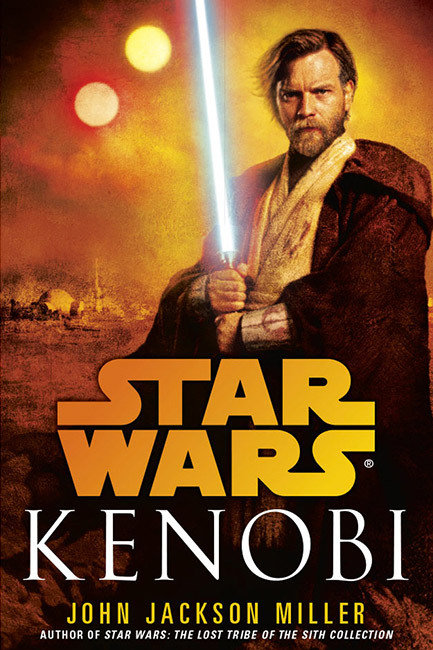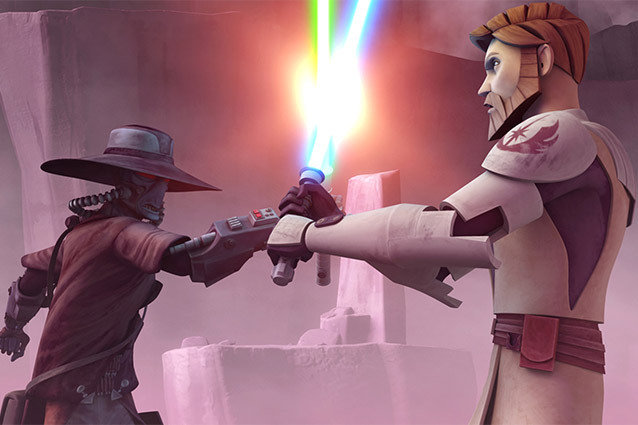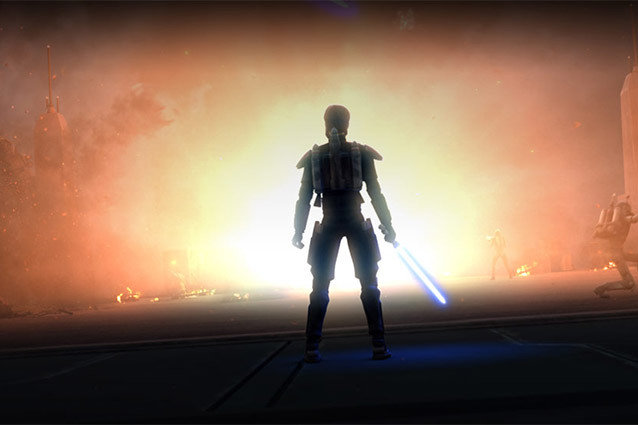 Random House
Random House
A little bit of the curtain has been peeled back on those mysterious 19 years between Revenge of the Sith and A New Hope in John Jackson Miller’s new novel Star Wars: Kenobi. It’s a story that Miller has been working on for seven years, and it concerns what happened after Obi-Wan lost everything: the Jedi Order, the Republic, his old love Satine, and his former Padawan turned Sith, Anakin Skywalker. Kenobi sees the exiled Jedi arrive on Tatooine where he’ll begin the long project of looking out for young Luke Skywalker from afar…until someday the time is right for him to reemerge. Of course, trouble always seems to follow Obi-Wan, and he gets into quite an adventure as he’s getting used to life on the desert planet. We talked to Miller and also voice actor James Arnold Taylor, who’s spent eight years voicing Obi-Wan for The Clone Wars TV series and various videogames, about the project.
Hollywood.com: John, for some years you’ve talked about doing a Star Wars Western. How did that become Kenobi?
John Jackson Miller: Well, I’d been writing Knights of the Old Republic for Dark Horse a couple of years and I was discussing with my editor the possibility of doing an original graphic novel starring Obi-Wan Kenobi. We were both big fans of Westerns, especially Shane, the Alan Ladd film from the ‘50s, and it struck me that the early days of Obi-Wan’s stay on Tatooine had to have been a lot like that. He was like the retired gunfighter wandering into town, trying to start over, begin a new life, keep his head down, and not get into trouble…and of course everything is pulling him into action. It’s a small town, so everybody is wondering who he is, why he’s come all this way — nobody moves to Tatooine unless they have to. It’s not a great tourist destination.
So we have that going on and the fact that at the same time, we know all these things that Obi-Wan is dealing with from the events of the Clone Wars series and Revenge of the Sith: Anakin’s fall, the death of the Duchess, all of these various things that have piled up on him. Instead of being at the center of galactic events where he could impact things he’s going to have to spend the next how many years — and he doesn’t know how long, it could be six months or the rest of his life — staying out of sight on Tatooine, and basically protecting the next generation.
That’s a really rough prospect for somebody who was used to action. The story we’ve told here is purposefully told from the point of view of other characters, the natives of Tatooine, a couple human settlers, and a few Tusken raiders. We can see Obi-Wan through their eyes, as he tries to react to situations as an ordinary man would, not a Jedi. The reader is in this unique situation, because we know that Clark Kent is really Superman here, we know what Obi-Wan is capable of, and so we’re able to travel with him through the storyline as he tries to make his way through the situation and find some peace.
HW: James, at the start of the novel what would you say is Obi-Wan’s mindset?
James Arnold Taylor: One of the things that’s been so great for me in playing this mythical character for so many years is that throughout the series of The Clone Wars I had to put myself in the mindset of “He does not know what’s going to happen.” He does not know that Anakin’s going to fall, and in Kenobi he actually thinks that Anakin is dead. His belief is that Anakin’s gone, and he did what he had to do. Even though I haven’t voiced him much after the events of Revenge of the Sith, it goes so much deeper than I think most people think.
Kenobi speaks as Obi-Wan speaks. That was always the biggest challenge of our show: getting the way Obi-Wan speaks right. And that comes across so well here in his meditations when he’s desperately trying to reach his mentor and his father figure Qui-Gon. There’s so much turmoil in his life and he has to hold it in, but those turmoils manifest in so many ways, including just his struggle to set up shop, get his home in place.
 Lucasfilm
Lucasfilm
HW: John, some have suggested that Star Wars in general, at least A New Hope, is a kind of Western. You’ve mentioned Shane. Were there any other Westerns in particular you drew upon for inspiration?
JJM: I was inspired quite a bit by Larry McMurtry who wrote Lonesome Dove. I think what’s special about that is that it gives us the Texas Rangers, yes, but we also get the point of view of the villagers surrounding them. We get to see what their ordinary lives are like and how their lives change when these almost mythical heroes pass through. Kenobi is also a stranger in a small town story. He’s having to learn the ropes of this place and integrate, when he’d much rather get out there and start freeing the Republic or crawl into a rock and never think of anything again. Instead he chooses to use this time to learn how he got there. He sees his exile as penance. Even at the end of the novel his prison term is still just beginning so to speak.
I love The Shawshank Redemption and when I realized that Obi-Wan ended up staying on Tatooine for exactly the same amount of time that Andy Dufresne was in prison — 19 years — I thought, okay, this is how much learning you can do in that time. This is a very different kind of Star Wars book: there are no lightsaber duels, because there are only two lightsabers on the planet, and Obi-Wan keeps one of them in his trunk. There are no space battles. It’s an internal story. Think about how Casablanca is a war movie that involves no war. It’s about the problems of three little people, but it’s about something much bigger at the same time. And I think Obi-Wan’s internal struggle mirrors the external struggle in the galaxy at this time.
HW: Did you guys collaborate at all on the making of this book?
JAT: Oh no, I would never dare do that. I’m just a fan like anybody else. I knew John was working on this because people were talking about it within my circle. I do see Obi-Wan as a hero, but he is paying a penance. He feels responsible for what happened and to a degree he is. Dave Filoni used to always joke to me and say, “It’s all Obi-Wan’s fault.” But Obi-Wan is a true believer, he’s trying to find the greater good in himself and in other people. And I think that’s what makes a great hero.
HW: How did you go about incorporating elements of the Clone Wars show into the novel?
JJM: When we get to him thinking about Satine, it’s when he’s pondering the various brushes with romance he’s had in his life. And when I started this project I went and just read everything that had been written about the character’s life at that point between Episodes III and IV. But I didn’t just want to do name drops, nor did I ever want to stop the story just to supply backstory, so the meditations with Qui-Gon helped with that. We have him thinking about his old love interest Siri Tachi from the Scholastic kids novels back in the day. Everything in the Expanded Universe counts, so I wanted to make sure some of those key characters received acknowledgement.
 Lucasfilm
Lucasfilm
HW: You threw in a lot of new elements to expand Tatooine, a planet we all thought we knew pretty well. How did you go about introducing us to Tatooine all over again?
JJM: I actually took a lot of stuff that was old. A lot of what we drew upon actually came from a series of roleplaying games released in the late ‘80s and early ‘90s by a company called West End. Before the Expanded Universe cranked into gear West End was the only game in town, so they had leeway to establish a lot of things, and I drew a number of characters, settings, and concepts from them.
However, there had never been a storyline where there was a Tusken point-of-view, and I wanted to create a mythology for them that explained why they were so attached to living in such miserable conditions and justify some of the horrible things they do. I hope I didn’t make them a fully sympathetic group here, because that wasn’t my intent. I didn’t want this to be Dances With Tuskens. I didn’t want them to appear justified in their actions, and in fact Obi-Wan has a line to this regard, “We can appreciate the differences between cultures without having to become lunch for the Sarlacc just because the Sarlacc needs to eat people.” The fact that the Tuskens do have this different worldview doesn’t necessarily make it right. This is where we could bring in the movies again, because the events of Star Wars Episode II, where Anakin wiped out an entire band of Tuskens overnight, are weighing very heavy on the group of Tuskens we meet in the story. They have lost their spirit, their confidence, and them getting that back is part of their storyline in the book.
HW: James, now that you’ve played Obi-Wan for so many years, what have you learned about him?
JAT: More than anything, that Obi-Wan has a deeper emotional life than you ever really see on the surface. Seeing how he goes from being a surrogate father to a brother for Anakin meant a lot to me in the prequels, especially since we know next to nothing about Obi-Wan’s own backstory, his family or where he came from himself. And that was always good for me. On a personal note, I don’t know my father, I never knew my father so I’m always fascinated how throughout the years the characters I’ve portrayed have very conveniently had the same issue. What backstory there was in the Expanded Universe I tried to avoid because Dave Filoni and George Lucas had such a clear vision of how they wanted Obi-Wan to be on the show that I just wanted to keep that pure. Now that the show’s over, Kenobi was a fantastic first Expanded Universe novel to read. It conveyed so much of what I’ve felt about the character, that he’s just a character who wants to do right, he wants to do good. He’s a striver, and that’s something many of us can relate to. What’s also wonderful is how much more depth now, because of the prequels, The Clone Wars, and Kenobi, there now is to that moment in A New Hope when Luke tells him that R2 says he’s “the property of Obi-Wan Kenobi,” and Obi-Wan gets that look in his eyes like, “This is it. My moment has come. I might actually get off this planet!”
HW: John, would you consider a follow-up to Kenobi showing Obi-Wan’s further adventures on Tatooine?
JJM: I would. Initially, I intended for this entirely to be a standalone story, because seven years ago when I started this we didn’t even know if we’d be allowed to explore the period after Revenge of the Sith. But I’d like to check in on some of the characters featured in Kenobi later on, not to mention that there are some big moments in Obi-Wan’s life forthcoming. At the point of this novel he doesn’t know that Anakin has survived and become Darth Vader yet. He finds that out in the epilogue to James Luceno’s Dark Lord: The Rise of Darth Vader, but there has to be more to that story. Also, things having to do with the discovery of what Anakin did to the Sand People. What I don’t want to see is a lot of people coming to visit Obi-Wan, or various threats coming to the planet. Tatooine becomes Gilligan’s Island at that point. And I can’t imagine he would leave the planet for anything but the most dire emergency. I think that protecting Luke Skywalker is his ultimate mission. To realize that he’s done all that he can do and only the next generation might have a shot at defeating the Emperor and correcting his mistakes for him is not an easy thing to deal with, especially if, like Obi-Wan, you’ve been at the center of events your whole life.
HW: When you think about it, Obi-Wan makes an astonishing number of mistakes throughout his life. Ultimately, do you see his life as a success story?
JAT: I think it’s a very human life in a world in a time when the expectation is to not be. What we’re drawn to in stories is the humanity of them, about people who are fallible, who are capable of making mistakes and then learning from those mistakes. And that’s why I’ve always liked Obi-Wan. That’s what makes him a hero to me. He’s a hero who in the end does the right thing and is troubled by what he’s done before that wasn’t the right thing.
More:
‘Star Wars Episode VII’ Casting Rumor: Who Would Alex Pettyfer and Rachel Hurd-Wood Play?
A First Look at the Cover Art for ‘Star Wars Death Star: Owner’s Technical Manual’
‘Star Wars: Crucible’ Author on Han, Luke, & Leia Passing the Torch
From Our Partners: A Complete History Of Twerking (1993-2013) (Vh1)
A Complete History Of Twerking (1993-2013) (Vh1) 15 Stars Share Secrets of their Sex Lives (Celebuzz)
15 Stars Share Secrets of their Sex Lives (Celebuzz)


